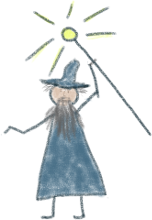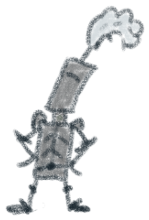
minimalist d6-based rules for old-school roleplaying game.
give them a name & an origin.
they start at level 1.
assign +2, +1, +1, 0, -1, -1 as you want to the domains: combat, instinct, stealth, wilderness, lore, athletics.
alternatively, roll for your modifiers:
| d6 | modifier |
|---|---|
| 1 | -1 |
| 2-4 | 0 |
| 5 | +1 |
| 6 | +2 |
normal characters have 5 wounds.
starting of the weakened health degree, characters suffer a modifier to all their actions.
| health | wounds left | mod |
|---|---|---|
| healthy | all | 0 |
| (scratched) | (5 or more) | (0) |
| weakened | 4 | -1 |
| hurt | 3 | -2 |
| wounded | 2 | -3 |
| crippled | 1 | -4 |
| out of action | 0 | n/a |
out of action characters must make a save check each round until they're healed, or die.
your character is either a magic-user or a non-magic user.
ask your gm if you're allowed to play a magic-user according to the settings and your origin.
any character can pick any of these non-magic perks, as long as they don't choose the magic-user career.
each perk gives +1 to any roll related to it, unless specified otherwise.
pick two (you can't pick the same perk twice):

all magic requires saying two words of power: an action and a realm. every 1st level caster starts out knowing three words of power, but must know at least one action and one realm.
regular clothes, a small blade or knife, a bag, rations for a couple of days.
your gm may accept to add items depending on your background.
you have d6 silver pieces (sp).
if the gm allows you to wear an armor.
armors may inflict movement penalties.
| armor type | ac | mov |
|---|---|---|
| no armor | 4 | 0 |
| light | 6 | -1 |
| medium | 8 | -2 |
| heavy | 10 | -3 |
| shield | +1 | n/a |

the gm should talk to the players about their characters.
where do they come from? what's their story?
do they have goals? a quest to fulfill?
what are their relationships? do they have friends, family, siblings? who are their enemies? what do they fear the most?
if it's likely, it happens.
if it's impossible, it doesn't.
only roll if the gm has doubts.
roll 2d6+domain, include armor or health modifiers when applicable.
success: the player describes.
failure: the gm decides.
mixed: the gm and/or other players can suggest the cost for mixed success. the gm has the final word.
once per session per level, you are allowed to reroll a dice roll.
beware! the reroll result becomes the final result, you can't reroll a reroll, whethere you like it or not.
optional: the gm may allow or forbid rerolls in case of save check.
the magic-user picks a combination of two words of power, one action and one realm, and describes the wanted effect.
e.g. kirshan the sorcerer want to combine infirmo (diminish) with navitas (energy) to extinguish a fire that has started in the inn his group was sleeping in. the fire is still small, so the gm agrees that the player can roll for it.
spells rolls is a 2d6+lore using the usual three-tier outcomes. failures can endanger the magic-user or characters around.
if the spell is offensive, your roll against the character ac (strictly greater). on a success, opponent decreases one degree of health.
you can roll level x spells per day. you need a full rest to recover your ability to cast spells.
helpers roll for the action. one plain success (10+) allows the helped character to reroll if needed.
at the beginning of the fight: roll 2d6+instinct.
the ones who succeed will act first, then the mixed successful ones, then the failures. each tier will be considered as simultaneous actions.
on your turn, you are allowed to make one action and one attack.
the action can be: move for a few meters, dodge, jump, take an item from your bag, change your weapon, etc. optionally, you can choose to make two actions ; normal characters can't make two attacks per round.
roll 2d6+combat and beat your opponent ac (strictly greater). on a hit, the character checks one degree of health.
the reroll rule also applies to attack rolls.
when all degrees are checked, the character is out of action, dying. if not healed rapidly, death will come.
make a save check each round. on a failure, the character dies.
when you're facing a dreadful danger, are out of action, poisoned or charmed, you'll have to roll 2d6 with no modifier. a result of 6- means failure, there's no mixed success.
failure usually means death.
heavy weapons, such as two-handed swords or battle-axes: you'll suffer a -1 malus, but two degrees are checked on a hit.
on a double 1, or "snake eyes": you fail miserably and your opponent hits you (check one degree).
on a double 6, or "crowns": you succeed and double your damages. optionally, you can choose to hit two targets instead of one.
the gm must reward clever choices and decisions, taking risks is okay, but lucky dice rolls would be the reward, not experience points. reward acting as a group, following the character's goals, quests or dreams.
surviving is already a reward in itself.
at the end of their first adventure, they'll reach level 2.
when they'll accomplish their common goal, they'll reach level 3.
when they'll fulfill their personal quest, they'll reach level 5.
when they'll have saved the lives of a whole kingdom, they'll reach level 8.
foes are defined by their:
fighting should not be the automatic options when pcs are encountering a foe or a monster. they can try to discuss, negotiate, bribe, flee, sneak behind them, etc. let the players be creative. prepare for the unexpected.
monsters are here for a reason. they're not xp livestock. they're not here to be killed. they can be afraid. they can flee. they can have a strategy. maybe they could see the pcs offer as a chance to escape their miserable life. or they're just hungry.
monsters have motivations. don't ignore this.
when the situation is taking a bad turn for the foes, the gm can make a morale check. this situation could be one of this non-exhaustive list:
whenever the gm feels the need to check the foes reaction, roll d6. if the foes power is negative, roll two dice and keep the lowest.
| roll | reaction |
|---|---|
| 1 | flee |
| 2 | surrender / parley |
| 3 | search for help / call to arms |
| 4 | try to trick the pcs / change strategy |
| 5 | try to capture / eat the pcs |
| 6 | keep up the fight |
| name | power | ac | wounds | notes / details |
|---|---|---|---|---|
| goblin | -1 | 4-6 | 1 | size: 2d6 individuals. +1 to attacks when in horde |
| giant rat | -1 | 8 | 1 | do not apply mov penalty, they're quick. |
| bandit | -1 — 0 | 6 | 4 — 6 | size: 1d6 or 2d6 individuals |
| orc | 0 | 7-8 | 3 — 4 | some wear shields or mails |
| skeleton | 0 | 6 | 5 | missiles or ranged weapons won't wound them |
| troll | 0 — +2 | 9 | 6 | heavy weapons (clubs or hammers) |
| giant snake | 0 — +2 | 6 | 5 — 7 | may be venomous (one save check vs. poison per round if bitten) ; constrict attack: one save check per round or you're out of action |
| giant spider | +3 | 9 | 7 | one save check vs. poison per round if bitten |
| dragon | +4 | 12 | 8 | knows 3-6 words of power ; fire does 2 wounds ; 2 attacks per round ; mov penalty (-4) only on the ground for movements, not when flying. |
the gm has to make sure they know every details about traps.
traps have a location (where is the "thing" that hurts), a trigger mechanism (where is it located? how does it triggers the trap?) and an effect (blades, darts, pit, poison, gas, agressive spell, crushing rocks or moving walls, etc).
with all these elements at hand, the characters would only get out of it if the players have to thoroughly searched for them to make sure they can detect, disarm or bypass the traps without being hit.
depending on their effect, traps will make from 1 to 3 wounds.
microsr text & illustrations are © Bruno Bord - 2018
creative commons cc-by